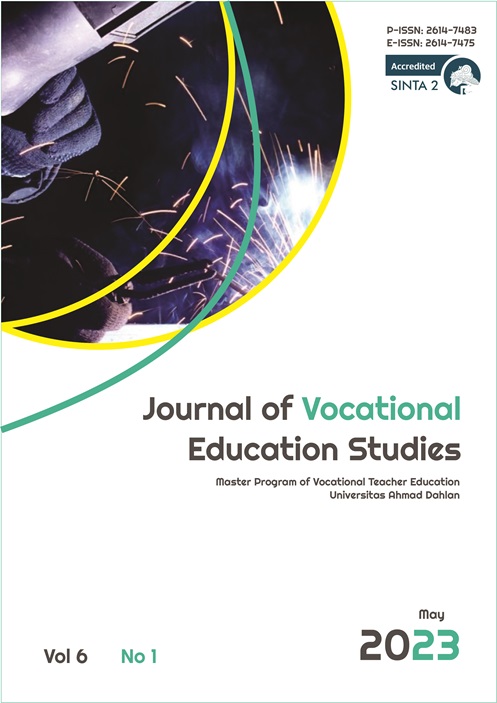Managerial Techniques Required of Principals of Technical and Vocational Colleges for Quality Assurance and Skill Acquisition
DOI:
https://doi.org/10.12928/joves.v6i1.7812Keywords:
Managerial Techniques, Technical and Vocational Education, Quality Assurance, Skills and AquisitionAbstract
The study is on the Managerial Techniques Required of Principals of Technical and Vocational Colleges for Quality Assurance and Skill Acquisition. The study was carried out in Lagos State. It covered all the six (6) technical colleges in the state. This study aimed to obtain information from respondents about the management of technical and vocational high school principals to ensure quality and skills are recognized. The population of the study included all the Principals, and Vice Principals, departmental and unit heads. A total of six principals, twelve vice principals, five departmental heads and fifteen unit heads were used for the study. A pilot study was conducted to ascertain the reliability of the questionnaire items which was calculated to be 0.69. Five research questions were raised for the study and the data collected analysed with mean and standard deviation. The result of the study showed that Principals of technical and vocational colleges apply some levels of managerial skills though do not involve teachers in policy and decision making, Most of the managerial techniques of Principals of technical and vocational colleges are not very adequate to enhance the quality of technical and vocational education.
References
Adegoke K.A. (2007) Standard in teacher preparation in Nigeria: some highlights.
Babayemi, A. (2006). Principalship Educational Management Thought and Practices. Ibadan: Codat Publication.
Center for Evaluation and Education Policy Analysis (2019). The Importance of School Facilities in Improving Student Outcomes. Retrieved from https://sites.psu.edu/ceepa
Ethel E. I (2013) Ensuring quality assurance in vocational Education. Contemporary Issues in Education Research. 6, (4)
Federal Republic of Nigeria (2004). National policy on education. Lagos: NERDC.
Isaac M. (2007). The professional development of principals. South Africa Joiurnal of Education. 27, (3). 523-540
Journal of Education for National development (JOEND), Vol.4No. 1 and 2. Unique Educational Publishers 1-6.
Kanelechi C.K. N & Tope O (2013). The new roles of school managers in managing educational changes in Nigerian schools. European Scientific Journal. 9 (25). https://eujournal.org
Lateef O (2018). Are Nigerian technical schools fulfilling their mandate? https://punchng.com/
Osuji J. N (2016) Impact of school facilities on students’ academic performances in public secondary schools in Giwa and Zaria education zones, Kaduna State, Nigeria. A Master dissertation submitted to the school of postgraduate studies, Ahmadu Bello University, Zaria,
Reitzug U. C (2002). School reform proposals: The research evidence. http://www.asu.edu/edu/epal
Sunday O. A (2010) Establishing quality assurance in Nigerian education system: Implication for educational managers. Educational Research and Reviews6(2), pp. 147-15. http://www.academicjournals.org/ERR
Torukwein M. D & Lesi E. S. K (2017). Principals’ managerial techniques as correlates of teachers’ service delivery in public secondary schools in Rivers State. International Journal of Scientific Research in Education, 10 (3), p 343-351.
Downloads
Published
Issue
Section
License
Copyright (c) 2022 Universitas Ahmad Dahlan

This work is licensed under a Creative Commons Attribution-ShareAlike 4.0 International License.
Authors who publish with Journal of Vocational Education Studies (JOVES) agree to the following terms: Authors retain the copyright and grant the Universitas Ahmad Dahlan right of first publication with the work simultaneously licensed under a Creative Commons Attribution License (CC BY-SA 4.0) that allows others to share (copy and redistribute the material in any medium or format) and adapt (remix, transform, and build upon the material) the work for any purpose, even commercially with an acknowledgement of the work's authorship and initial publication in Universitas Ahmad Dahlan. Authors are able to enter into separate, additional contractual arrangements for the non-exclusive distribution of the journal's published version of the work (e.g., post it to an institutional repository or publish it in a book), with an acknowledgement of its initial publication in Universitas Ahmad Dahlan. Authors are permitted and encouraged to post their work online (e.g., in institutional repositories or on their website) prior to and during the submission process, as it can lead to productive exchanges, as well as earlier and greater citation of published work (See The Effect of Open Access).










.png)



